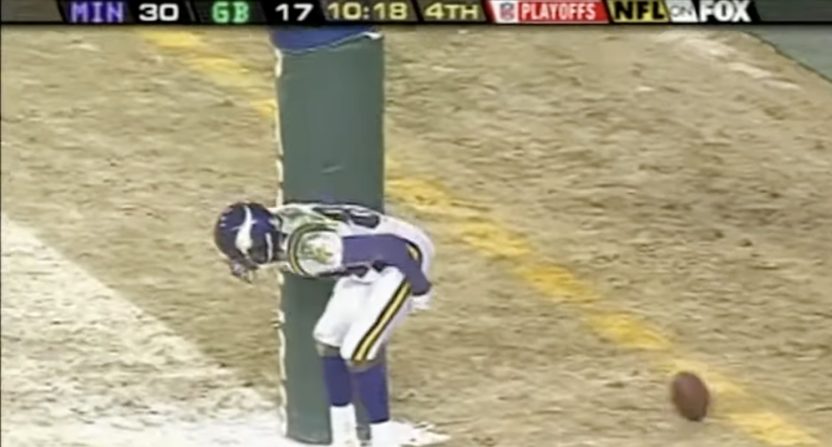Post by Funkytown on May 19, 2020 14:20:56 GMT -6
Another day, another Kirk Cousins debate. Surprise, surprise!
Was the Kirk Cousins contract extension a mistake? by Ben Rolfe
Two months ago the Minnesota Vikings signed Kirk Cousins to a two-year contract extension that at the time made sense, but now raises a lot of questions.
Link:
www.profootballnetwork.com/kirk-cousins-contract/
I guess some of my questions would be:
- Is his contract always going to be considered a mistake if we don't win the Super Bowl? Is it that black and white for you?
- Are we always considered Super Bowl or Bust with Cousins? If so, why?
- When trying to build a team to compete for the Super Bowl, do you find it smarter to solidify the QB position with a Top 10ish guy and build around him and hope it's enough ... or do you continue to spend significant draft capital to find the next Mahomes? A little bit of both?
Comparable Example: Do you think it was wise for Green Bay to ignore the now and plan for the future with Aaron Rodgers still at quarterback? What is the perfect balance between remaining competitive (and trying to win the big game) and planning for the future? Or is the future overrated in the Packers' and Vikings' situations? Is the future now?
Was the Kirk Cousins contract extension a mistake? by Ben Rolfe
Two months ago the Minnesota Vikings signed Kirk Cousins to a two-year contract extension that at the time made sense, but now raises a lot of questions.
Despite a slightly down year in 2017, Cousins secured the first-ever fully guaranteed contract in NFL history. That three-year, $84 million deal has been scrutinized ever since. Then on March 16th this year, with Cousins set to count $30 million against the cap in 2020, the Vikings negotiated an extension that would reduce Cousins’ cap hit in 2020 to just $21 million. The cost of that salary cap reduction? Another $66 million on Cousin’s deal over an additional two years.
Breaking down Cousins’ 2020 extension
As part of the two-year, $66 million contract, $51 million is guaranteed, $30 million of which is signing bonus. That signing bonus prorates across the three years of his deal, with a $10 million cap hit per year. In 2020, that number sits at $11.5 million as it also encompasses the final year of the prorated $4.5 million signing bonus from his original contract with the Vikings.
The problem with the contract is in the details. As it stands, the third year of Cousins’ deal is not guaranteed, which would mean the Vikings could get out of the deal with only the $10 million prorated signing bonus counting against the cap. However, it is not that simple because Cousins’ $35 million salary in 2022 becomes fully guaranteed on the third day of the 2021 league year.
Therefore, the Vikings have close to an impossible decision in March 2021. They could cut Cousins and prevent the 2022 salary from becoming guaranteed, meaning Cousins would count a whopping $45 million against the cap in 2022 if they did not further restructure his deal. However, cutting Cousins in 2021 to prevent that money in 2022 from becoming guaranteed would mean the Vikings would have to eat the prorated $10 million signing bonuses for both 2021 and 2022 as well as the $21 million in guaranteed salary Cousins is due in 2022.
Doing this would mean that instead of Cousins counting $31 million against the cap while playing for the Vikings in 2021, he would count $41 million against their cap while likely playing on another team’s roster.
What are the potential options for the Vikings?
That leaves three viable options for the Vikings in how to handle the final two years of Cousins’ deal. Firstly, they could cut him prior to March 16th but designate him a post-June 1 move. That would mean that $31 million would count against the cap in 2021, with the remaining $10 million sitting on the 2022 cap. While not ideal, it saves the guaranteed salary in 2022 while also spreading the damage somewhat between the 2021 and 2022 cap.
Option 2 would involve another extension in 2022 to further spread the money. This is the type of move we have seen done many times before, pushing the boat further down the river in the hope of a Super Bowl in the short term. Given the way the Vikings have handled Cousins so far, this seems more likely than option 1.
The final option is for the Vikings to look at the contracts for Drew Brees and Tom Brady in recent years. The Vikings could look to extend Cousins but add void years to the deal, spreading the cap hit even though Cousins may be playing elsewhere. This is somewhat of a combination of the first two options and is one that comes with plenty of risks given the effects it can have on rosters down the line.
The problem for the Vikings is that, with the unknowns surrounding the 2020 NFL season due to the current global health crisis, there is a risk that the salary cap does not rise in 2021. In fact, there is even talk the cap could shrink next offseason. This is contrary to the belief around the league just three months ago that the salary cap could be set to boom with a new television deal due in a couple of years’ time.
That expected salary-cap boom would have dampened the effect of Cousins $45 million 2022 cap hit. But if it does not rise, that $45 million would be close to 20% of the current salary cap. These were all ramifications that the Vikings had to balance when they made the decision to extend Cousins’ contract. The problem was that they were simply running out of time to make a decision as the 2020 league year approached.
Breaking down Cousins’ 2020 extension
As part of the two-year, $66 million contract, $51 million is guaranteed, $30 million of which is signing bonus. That signing bonus prorates across the three years of his deal, with a $10 million cap hit per year. In 2020, that number sits at $11.5 million as it also encompasses the final year of the prorated $4.5 million signing bonus from his original contract with the Vikings.
The problem with the contract is in the details. As it stands, the third year of Cousins’ deal is not guaranteed, which would mean the Vikings could get out of the deal with only the $10 million prorated signing bonus counting against the cap. However, it is not that simple because Cousins’ $35 million salary in 2022 becomes fully guaranteed on the third day of the 2021 league year.
Therefore, the Vikings have close to an impossible decision in March 2021. They could cut Cousins and prevent the 2022 salary from becoming guaranteed, meaning Cousins would count a whopping $45 million against the cap in 2022 if they did not further restructure his deal. However, cutting Cousins in 2021 to prevent that money in 2022 from becoming guaranteed would mean the Vikings would have to eat the prorated $10 million signing bonuses for both 2021 and 2022 as well as the $21 million in guaranteed salary Cousins is due in 2022.
Doing this would mean that instead of Cousins counting $31 million against the cap while playing for the Vikings in 2021, he would count $41 million against their cap while likely playing on another team’s roster.
What are the potential options for the Vikings?
That leaves three viable options for the Vikings in how to handle the final two years of Cousins’ deal. Firstly, they could cut him prior to March 16th but designate him a post-June 1 move. That would mean that $31 million would count against the cap in 2021, with the remaining $10 million sitting on the 2022 cap. While not ideal, it saves the guaranteed salary in 2022 while also spreading the damage somewhat between the 2021 and 2022 cap.
Option 2 would involve another extension in 2022 to further spread the money. This is the type of move we have seen done many times before, pushing the boat further down the river in the hope of a Super Bowl in the short term. Given the way the Vikings have handled Cousins so far, this seems more likely than option 1.
The final option is for the Vikings to look at the contracts for Drew Brees and Tom Brady in recent years. The Vikings could look to extend Cousins but add void years to the deal, spreading the cap hit even though Cousins may be playing elsewhere. This is somewhat of a combination of the first two options and is one that comes with plenty of risks given the effects it can have on rosters down the line.
The problem for the Vikings is that, with the unknowns surrounding the 2020 NFL season due to the current global health crisis, there is a risk that the salary cap does not rise in 2021. In fact, there is even talk the cap could shrink next offseason. This is contrary to the belief around the league just three months ago that the salary cap could be set to boom with a new television deal due in a couple of years’ time.
That expected salary-cap boom would have dampened the effect of Cousins $45 million 2022 cap hit. But if it does not rise, that $45 million would be close to 20% of the current salary cap. These were all ramifications that the Vikings had to balance when they made the decision to extend Cousins’ contract. The problem was that they were simply running out of time to make a decision as the 2020 league year approached.
www.profootballnetwork.com/kirk-cousins-contract/
I guess some of my questions would be:
- Is his contract always going to be considered a mistake if we don't win the Super Bowl? Is it that black and white for you?
- Are we always considered Super Bowl or Bust with Cousins? If so, why?
- When trying to build a team to compete for the Super Bowl, do you find it smarter to solidify the QB position with a Top 10ish guy and build around him and hope it's enough ... or do you continue to spend significant draft capital to find the next Mahomes? A little bit of both?
Comparable Example: Do you think it was wise for Green Bay to ignore the now and plan for the future with Aaron Rodgers still at quarterback? What is the perfect balance between remaining competitive (and trying to win the big game) and planning for the future? Or is the future overrated in the Packers' and Vikings' situations? Is the future now?





















 ... and neither is this Chris guy.
... and neither is this Chris guy.